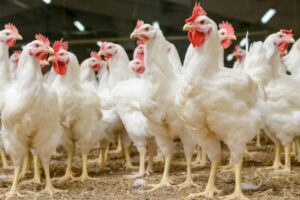
Avesterra Group intends to increase its poultry population to 10 million, build a feed mill, and expand its land bank to 25,000 hectares, co-owner Dmitry Dobkin said in an interview with Liga.net.
“We will build poultry farms. We currently have capacity for 4.1 million birds. We need to develop this to 10 million birds per batch. In turn, this pace of development requires the modernization of the existing feed mill or the construction of a new one. This is because the existing one will definitely not be able to cope with the new production capacity,” he said.
Dobkin said that the group had accumulated a land bank of 3,000 hectares for the construction of a modern poultry processing plant in the Volyn region. However, in order to be independent from external cataclysms and to provide the poultry farm with feed, there are plans to expand the land bank to 25,000 hectares of fields.
He said that another way to minimize production risks is to create their own incubation facility, including the formation of a parent flock.
“Then the entire chain from egg to finished meat will be ours,” Dobkin emphasized.
Avesterra Group was established in January 2025. It includes Volodymyr-Volynskyi Poultry Farm and Lutsk Agrarian Company, which produce 53,000 tons of broiler meat per year. Annual revenue is about UAH 4 billion. Of the 5,000 tons of total production, 700 tons are sold under the Epicur brand, and the rest under the Chebaturochka brand.
In June 2025, the group launched a processing plant, in which it invested EUR 60 million. It is located in Volyn, covers 30,000 square meters, and has new treatment facilities.
The business is owned in equal shares by the Dobkin family.
Volodymyr-Volynskyi Poultry Farm accounts for about 5% of the Ukrainian chicken market. It has seven branches: Kharkiv, Kyiv, Odesa, Dnipro, Vinnytsia, Lviv, and Volodymyr. The factory’s infrastructure consists of 100 poultry houses, a slaughterhouse, and a feed mill. The company also has its own land fund of 3,000 hectares, where it grows cereals and legumes for the production of compound feed, as well as industrial crops. The factory employs over 1,500 people.
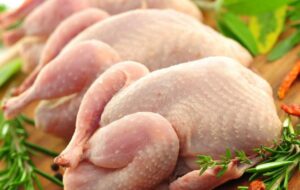
Exports of poultry meat brought Ukraine almost $1 billion in 2024, the Verkhovna Rada Committee on Agrarian and Land Policy reported, citing information from the State Customs Service of Ukraine.
According to the report, in 2024, the Ukrainian poultry industry demonstrated an increase in exports, which increased by 5.7%, and revenues, which increased by more than 20%.
At the same time, exports of poultry meat and edible offal reached 448.8 thousand tons, which is 5.7% more than in the previous year. Total exports amounted to $962.7 million, which is 20.4% higher than in 2023.
The main importers of Ukrainian products were the Netherlands, which purchased 23.2% of total exports. Saudi Arabia ranked second with a share of 16.1%, and Slovakia was third with 8.5%.
In 2024, Ukraine also exported 77.8 thousand tons of eggs, which is 59.4% more than a year earlier. In monetary terms, exports increased by 22.5% compared to 2023 to $74.5 million. The main buyers of Ukrainian eggs were Israel (14.1%), Poland (11.7%) and Italy (11.1%).
The growth in exports demonstrates the high competitiveness of Ukrainian products in the international market and the efficiency of domestic producers. Expanding the geography of supplies and increasing demand for Ukrainian poultry and eggs once again emphasize its quality and compliance with international standards, the MPs noted.
The Verkhovna Rada emphasized that these indicators are a positive signal for the further development of the poultry industry in Ukraine, in particular for attracting new investments and expanding export potential.
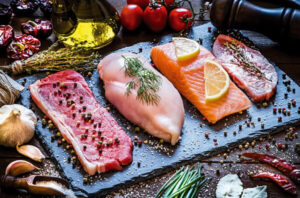
Ukraine and China are working to open the Chinese market for Ukrainian peas, poultry, corn, and fish products, the press service of the State Service for Food Safety and Consumer Protection reports.
“China is an important market for national exporters of agricultural products, so on behalf of the head of the State Service of Ukraine for Food Safety and Consumer Protection, Serhiy Tkachuk, the service and the competent authority of China continue to interact on a regular basis. Our goal is to open seven new markets. This is a long process of coordination, but step by step we are succeeding,” said Oleh Osiyan, First Deputy Head of the State Consumer Service, at a meeting with representatives of the General Administration of Customs of the People’s Republic of China (GACC).
The parties discussed draft bilateral international agreements on the export of peas, wheat flour, pet food, beef, corn, poultry, and wild-caught aquatic products from Ukraine to China. Each of these documents is at a different stage of development and approval.
“Currently, the protocol on peas is at the stage of finalizing domestic approval in Ukraine, and the texts have been sent to the competent authority of China for consideration. This is one of the markets that is at the final stage of opening. After the signing of the bilateral protocol, new opportunities for pea exports will open up for Ukrainian agricultural businesses,” said Vadym Chaikovskyi, Deputy Head of the State Service of Ukraine for Food Safety and Consumer Protection and Chief State Phytosanitary Inspector of Ukraine.
It should be reminded that the last Ukrainian product to be granted access to the Chinese market was honey. The form of the health certificate for its export was agreed upon earlier this year.
The requirements of the countries of destination for the export of food products of animal and plant origin are published on the official web portal of the State Service of Ukraine on Food Safety and Consumer Protection.
“Currently, our Chinese colleagues are considering draft protocols on the export of poultry and fish. The State Service of Ukraine on Food Safety and Consumer Protection sent its proposals on the text of the protocol in the fall. The protocol on wild-caught aquatic products has already passed domestic approval and is at the stage of final approval by the Chinese side. The texts of the protocols on beef and pet food are also undergoing the stage of internal approval,” said Volodymyr Kusturov, Deputy Head of the State Service of Ukraine for Food Safety and Consumer Protection and Chief State Veterinary Inspector of Ukraine.
Representatives of the State Food and Consumer Service and the GACC discussed in detail the steps for further cooperation, draft bilateral agreements, and agreed to continue active cooperation on the development of international trade between Ukraine and China.
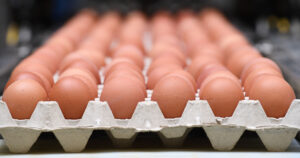
Romania has expanded the list of goods imported from Ukraine that require a license to enter the country to include eggs and poultry meat, Euractiv.ro reported, citing information from the Romanian government. The publication reminded that Romanian poultry producers faced a “serious problem” due to the import of eggs and poultry meat from Ukraine, which are sold at prices significantly lower than the cost of production in Romania.
According to the Minister of Agriculture Florin Barbu, after discussions with representatives of the poultry industry, the government decided to add eggs and poultry meat to the list of products that can be imported from Ukraine only with a license. The list also includes cereals, seeds, flour and sugar.
“It is our duty to protect Romanian production,” Barbu said.
In addition, he reminded that Romania, as a member of the European Union, must comply with certain production requirements in the poultry sector, which is why Romanian poultry farmers have “30% higher costs than in Ukraine.”
Barbu also emphasized that there is no ban on imports of Ukrainian eggs and poultry meat.
“We have made this decision on licensing to ensure that when the food industry needs these products and Romania is not completely self-sufficient, only Romanian processors will be able to import them under license,” he added.
After the European Commission decided not to extend the ban on imports of Ukrainian grain to five neighboring EU countries (Bulgaria, Poland, Romania, Slovakia, and Hungary) in September 2023, Romania introduced import licenses for grains and oilseeds from Ukraine and Moldova. This measure, introduced in October last year, was extended.
According to this decision, only Romanian companies engaged in the production of oil and fat products, flour milling, animal feed production and livestock farming are entitled to import agricultural products from Ukraine and Moldova.

MHP Food and Agricultural Holding, Ukraine’s largest chicken producer, reduced meat exports from Ukraine by 12% to 87,799 thousand tons in April-June 2024.
According to the holding’s report on the London Stock Exchange on Friday, MHP increased poultry production in the European operating segment (PP) to 35.46 thousand tons, up 6.5% year-on-year.
The agricultural holding noted that the volume of meat production in Ukraine remained stable in the period under review at 187.414 thousand tons against 181.69 thousand tons in the same period last year.
At the same time, the average price of poultry meat in Ukraine remained stable and was in line with last year’s figure at $1.97 per kg (excluding VAT). The average price for poultry produced in the European segment also remained virtually unchanged at EUR3.54 per kg compared to EUR3.64 per kg in the same period last year.
MHP reduced poultry exports from Ukraine in the second quarter of 2024 by 12% to 87,799 thousand tons compared to the same period last year.
In January-June of this year, the agricultural holding practically did not change the volume of poultry production in Ukraine – 365.901 thousand tons against 359.332 thousand tons in the same period of 2023. The volume of poultry production in the European segment of MHP increased by 7% to 69,418 thsd tonnes. A year earlier in the same period, this figure was 65,087 thousand tons.
The average price of MHP poultry in Ukraine remained almost unchanged at $1.98 per kg excluding VAT, compared to $1.92 a year earlier. The average price for poultry meat produced in the European segment also remained virtually unchanged at EUR3.49 per kg in the first six months of 2024 (EUR3.58 per kg in the first six months of 2023).
In the first half of 2024, MHP reduced poultry exports from Ukraine by 12% to 185.854 thousand tons. A year earlier, this figure was 212.106 tons for the same period.
The total volume of poultry sales to third parties in January-June 2024 decreased by 8% year-on-year to 327.215 thousand tons, mainly due to a significant decrease in export sales, the agricultural holding explained.
At the same time, the total sales of processed poultry meat in the first half of this year increased by 19% to 20.386 thousand tons due to production growth and further transformation into a culinary company. The average price of value-added products increased by 4% to $2.90 per kg as a result of changes in the product mix.
MHP is the largest chicken producer in Ukraine. The company produces cereals, sunflower oil, and processed meat products.
As reported, the company received $142 million in net profit in 2023 compared to $231 million in net loss a year earlier. The group’s revenue increased by 14% to $3.021 billion last year.
In the second quarter of 2024, MHP earned $29 million in net profit, up 71% compared to the second quarter of 2023. Its EBITDA increased by 40% to $153 million, while revenue decreased by 5% to $770 million. The agroholding attributed the increase in profitability to improved performance in the crop sector.
Overall, net profit decreased by 33% to $45 million for the half-year, due to foreign exchange losses of $81 million against $5 million in the first half of 2023.
EBITDA in crop production increased by 20% to $280 million, while revenue decreased by 4% to $1.489 billion.
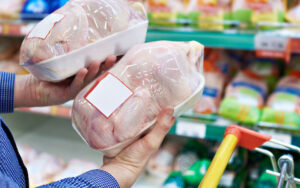
The Ukrainian government has introduced a quota for exports of poultry and poultry by-products to the EU in the amount of about 137,000 tons starting July 1.
According to Cabinet of Ministers Resolution No. 612 of May 30, published on the government portal, the quota for the supply of poultry meat and edible offal to the EU, including chickens, geese, ducks, guinea fowl (UKTZED code 0207), is set at 133.28 thousand tons, and turkey meat and edible offal (UKTZED code 0207 24-27) at 3.76 thousand tons.
The Ministry of Economy will consider applications for licenses to export these goods to the EU within 10 days. Permits will be issued on the basis of applications and approvals provided by the Ministry of Agrarian Policy.
For the period of martial law, applicants shall prepare and submit documents electronically through the relevant information and communication systems (the Ministry of Economy’s electronic services portal, the Unified State Web Portal of Electronic Services).
The licensing regime for the export of quota goods to the EU is also mandatory if the non-resident counterparty is registered in the EU under a foreign economic agreement (contract).
At the same time, the volume of quotas approved for the commodity item “Meat and edible offal of poultry: poultry chickens, ducks, geese, guinea fowl”, excluding the reserve quota of 1400 tons for new exporters, and for the commodity “Turkey meat and edible offal of turkeys” is distributed by the Ministry of Agrarian Policy among exporters in proportion to the actual volume of their exports to the EU in the first quarter of 2024. Information on the actual export volumes of these products for the first quarter of 2024 must be provided by exporters to the Ministry of Agrarian Policy with supporting documents by June 25, 2024.
The reserve quota of 1400 tons will be distributed among exporters who did not export these products in the first quarter of 2024.
If there is an unused balance of the quota as of November 1, 2024, it is distributed among exporters in proportion to the actual exports of these products to the Member States of the European Union for the three quarters of 2024.
As reported, on May 13, the EU Council finally approved the extension of the autonomous trade measures for another 12 months – until June 5, 2025. At the same time, restrictions have been imposed on the duty-free supply of a number of agricultural products – poultry, eggs, sugar, oats, cereals, corn and honey – in the amount of the average export volume for the period from the second half of 2021 to the end of 2023.